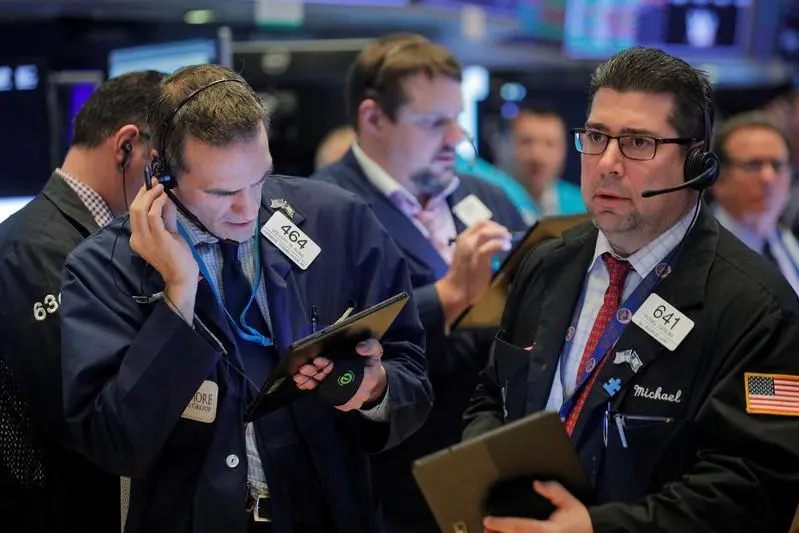PHOTO
NEW YORK: The dollar fell and global equity markets backed down from fresh highs on Friday on troubling signs of renewed U.S.-Iranian tensions.
The United States said it was imposing additional sanctions on Iran as a result of its missile attack on U.S. troops in Iraq this week, and Washington rebuffed an Iraqi request to pull out the troops.
Iraq appears set to bear the brunt of any further violence between its neighbor Iran and the United States, sparked by the U.S. killing of Qassem Soleimani, Iran's top general, in a drone strike on Jan. 3. Iran's firing of missiles at U.S. forces in Iraq on Wednesday was in response to the general's killing.
A gauge of equity performance in 49 countries hit a record as did the three major Wall Street indexes in early trade after the U.S. Labor Department's monthly jobs report showed that the pace of hiring in December was sufficient to keep the economic expansion on track, but stock markets later slid as investors eyed the longer-term risks of Middle East conflict after Soleimani's death.
The dollar fell from four-week highs against the safe-haven yen and slid versus the Swiss franc, another safe-haven.
"The fact that the U.S. is still sort of acting aggressively toward Iran and still taking a hard line, helped create demand for safe havens," said Karl Schamotta, chief market strategist at Cambridge Global Payments in Toronto.
MSCI's all-country world index gained 0.03%, paring an early advance that lifted it to an all-time high.
Stocks on Wall Street retreated after the Dow Industrials earlier crossed the 29,000 mark for the first time, helped by gains in technology and healthcare stocks.
The Dow Jones Industrial Average fell 104.95 points, or 0.36%, to 28,851.95, the S&P 500 lost 5.44 points, or 0.17%, to 3,269.26, and the Nasdaq Composite dropped 13.23 points, or 0.14%, to 9,190.20.
Technology shares were among the day's leaders and were on track for the sharpest weekly gains among the 11 main S&P sectors. News that sales of Apple Inc's iPhones in China in December jumped more than 18% on the year cheered investors.
European shares also retreated. The pan-European STOXX 600 index lost 0.12% and Germany's DAX fell 0.09%, while Britain's FTSE 100 closed down 0.14%.
The Labor Department reported the U.S. jobless rate held steady at near a 50-year low of 3.5% last month and nonfarm payrolls increased by 145,000 jobs, above the 100,000 mark needed to keep up with population growth but well below expectations.
Emerging market stocks rose 0.31%.
The soft U.S. payrolls number, following a batch of strong economic figures, was unlikely to sway the Federal Reserve from its current neutral stance on rates, analysts said.
"The economy continues to grow and there's an absence of inflation pressure, and that's positive for stocks and bonds," said Joseph LaVorgna, chief economist for the Americas at French bank Natixis in New York.
The dollar index fell 0.08%, with the euro up 0.12% to $1.1118. The Japanese yen weakened 0.01% versus the greenback at 109.54 per dollar gained 0.03.
MSCI's emerging market currency index, was little changed on Friday after hitting a 1-1/2-year high on Thursday, but was still likely to post its sixth straight week of gains.
Oil fell below $65 a barrel in its first weekly loss since late November, erasing the week's risk premium sparked by the killing of the top Iranian general as investors focused on rising U.S. inventories and other signs of ample supply.
However, worries over the longer-term risks of conflict could potentially push prices higher.
Brent crude LCOc1 , the global benchmark, slid 39 cents to settle at $64.98 a barrel, its first weekly decline in six weeks. West Texas Intermediate crude CLc1 settled down 52 cents to $59.04.
U.S. gold futures GCv1 settled up 0.4% at $1,560.1 an ounce.
(Reporting by Herbert Lash Additional reporting by Gertrude Chavez-Dreyfus in New York; Editing by Leslie Adler) ((herb.lash@thomsonreuters.com; 1-646-223-6019; Reuters Messaging: herb.lash.reuters.com@reuters.net))





















